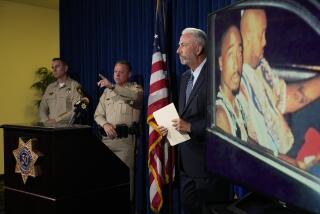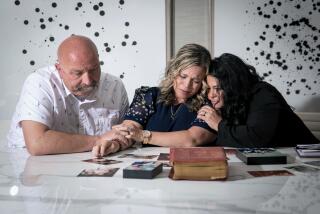Kennedy Kin Surrenders in ’75 Killing of Neighbor
- Share via
BOSTON — In a Greenwich, Conn., murder case that has frustrated authorities for a quarter of a century, a nephew of the late Sen. Robert F. Kennedy returned to Connecticut on Wednesday to answer charges that he bludgeoned a childhood friend to death with a golf club.
Michael Skakel, under suspicion from the start in the killing of 15-year-old Martha Moxley, turned himself in Wednesday after authorities issued a warrant for his arrest. Because Skakel was 15 at the time of the slaying on Halloween eve 1975, the case is initially being prosecuted as a juvenile crime. He was released on $500,000 bond.
“Michael Skakel is innocent,” his attorney, Michael R. Sherman, declared at a news conference in Bridgeport. “He was innocent 24 years ago. He is innocent today.”
In the blueblood town of Greenwich, the Moxley killing has been at once a tragedy and a source of embarrassment. Homicide is so rare in Greenwich that only one case has been reported in the last 13 years. The Moxley case combined the elements of a gripping mystery: wealth, prominent families, charges of bungled police work and the involvement years later of a big-time novelist and a notorious detective.
In another twist, after local authorities failed to bring charges, the warrant emerged from an 18-month investigation by a judge who served as a special one-man grand jury. Prosecuting a 39-year-old as a juvenile is highly irregular; in fact, under juvenile law, Skakel’s name was not included in the warrant, though his attorney confirmed that he is the suspect. Juvenile law also could require details of the evidence against Skakel to remain sealed.
The Moxley case has been the subject of several books, including a best-selling novel, “A Season in Purgatory,” by Dominick Dunne, that became a TV movie. Dunne brought the case to the attention of former Los Angeles Police Det. Mark Fuhrman, whom he met while covering the O.J. Simpson murder trial. Fuhrman--plagued by accusations of racism as the lead investigator in the Simpson case--wrote his own book, “Murder in Greenwich,” about the Moxley case. Fuhrman posited that Skakel killed Moxley in a jealous rage after seeing his older brother kiss her.
Sharply critical of the initial investigation by Greenwich police, Fuhrman provided the grand jury with evidence of a 1998 book proposal by Skakel to be called “Dead Man Talking” that reportedly made an incriminating reference to the Moxley killing. Skakel also discussed aspects of the crime in therapy sessions in the 1970s at an alcohol rehabilitation center in Maine, according to prosecutors.
Although Connecticut authorities have downplayed Fuhrman’s role, in a telephone interview from New York, he said Wednesday that “I kind of consider what happened today to be my greatest victory in law enforcement. How many detectives in their career can say they solved a 25-year-old homicide, they helped a nice family and they helped the wheels of justice not protect a rich family, for a change?”
Skakel and his older brother Thomas--sons of a wealthy industrialist who is the brother of Robert F. Kennedy’s widow, Ethel--were considered likely suspects from the outset. The Skakels were neighbors of the Moxley family in a gated Greenwich neighborhood so exclusive it did not have street signs.
On the night of her death, Martha Moxley joined friends for some pre-Halloween pranks. The young people stopped at the Skakels’ house, where Martha and Thomas were seen roughhousing in the driveway. Her body was found the next morning under a pine tree about 200 yards from her house.
Moxley’s skull was smashed repeatedly with a Toney Penna six iron, with such force that the metal shaft was broken in two. One end was driven through her neck. The handle portion was never recovered, but the club matched a set owned by the Skakel family. No evidence of sexual assault was established.
From the beginning, the case was marked by missteps. Crucial evidence disappeared. Michael Skakel was never questioned. Thomas told a story of working on a homework assignment that school officials said never existed. By the time police visited the Skakel household, a maid had done the laundry.
For years the case languished. Moxley’s father died and her mother moved away. The Skakel boys grew up, married and had children of their own. For years, Michael Skakel worked in a Massachusetts oil business with his cousin, the late Michael Kennedy. Later, Skakel moved to Florida.
Determined to protect his sons, industrialist Rushton Skakel hired a private detective whose report included interviews with the two boys. The elder Skakel’s effort backfired when the report--showing that the Skakel brothers had changed their stories and placing them both close to the crime scene--was leaked to novelist Dunne and became a key element in Fuhrman’s book.
The resignation in 1998 of a state’s attorney who had overseen the case for 22 years also contributed to its reopening. Frustrated by a lack of progress in the investigation, his successor, Jonathan Benedict, requested the appointment of an investigative grand jury. In Connecticut, this consists of a single judge.
Over the course of the next year and a half, Superior Court Judge George Thim heard testimony from more than 40 witnesses. Among them was Rushton Skakel, who bitterly fought the subpoena. As targets of the inquiry, neither Skakel brother testified before the grand jury.
Late Wednesday afternoon, Michael Skakel turned himself in at Greenwich police headquarters. Police Chief Peter Robbins said Skakel “was processed as an arrestee for the crime of murder.”
No court date or arraignment has been set. Thim said he expected no other arrests.
Adults who are tried for crimes committed as juveniles begin the judicial process in juvenile court. Typically, the cases are then moved to adult court.
At a news conference, Skakel’s lawyer predicted his client would be vindicated. “He’ll appear in court, he’ll plead not guilty, there will be a trial and I believe eventually he will be acquitted,” Sherman said.
The lawyer also discounted suggestions that the Kennedy family influenced the case in any way. “It’s not a Kennedy trial. . . . It’s not an O.J. trial. It’s a trial of a young man charged with killing his next-door neighbor,” Sherman said.
At home in New Jersey, Dorthy Moxley told the Daily Record of Morris County that tracking down the alleged killer of her daughter “has been the fight of my life.”
Moxley, who worked closely with Fuhrman, added, “This is a wonderful day, I just hope they find him guilty. This is what I’ve been waiting for.”
More to Read
Sign up for Essential California
The most important California stories and recommendations in your inbox every morning.
You may occasionally receive promotional content from the Los Angeles Times.













